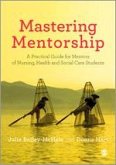What is dementia? How should we organize dementia care? This comprehensive book critically examines the main approaches to understanding dementia (bio-medical, social-psychological and socio-gerontological) and the main principles and ideologies of care. The book: . provides clarity on the gap between the utopian aspirations of care and the reality of care . opens up a series of questions about knowledge and treatment of dementia . argues for a transition from positions that place emphasis upon the individual or particular care services to the social, cultural and economic context Lively, informative and challenging, the book will be of interest to students of nursing, sociology of health & illness, social work and social gerontology. Anthea Innes teaches at the Dementia Services Development Centre, University of Stirling
Hinweis: Dieser Artikel kann nur an eine deutsche Lieferadresse ausgeliefert werden.
Hinweis: Dieser Artikel kann nur an eine deutsche Lieferadresse ausgeliefert werden.
A provocative and stimulating work that will be used by academics and advanced students of dementia, sociology and social gerontology for some time...This synthesis of dementia studies from a social science perspective is a valuable academic resource. In particular, it highlights the need for future dementia studies to examine not only the micro level of the experiences of people with dementia but also the social systems and processes that continue to shape their lives
Ageing and Society
The book can be useful to readers of a variety of backgrounds, including students and researchers in Gerontology, Health and Medical Sciences, Social Work, Social Policy, Sociology and Psychology. It should also appeal to practitioners who work with people living with dementia. I could imagine even the friends and family members of people living with dementia might find the book interesting...Both useful and highly readable
International Journal of Ageing and Later Life
'This is an important and innovative text examining social science perspectives relating to dementia. Innes provides a comprehensive guide to the research literature, drawing on critical perspectives within Sociology and Social Gerontology. The book makes a significant contribution to re-thinking practice and policies for people with dementia
Chris Phillipson
Professor of Applied Social Studies and Social Gerontology, Keele University
Anthea Innes, through the lens of a social scientist, provides a much needed historical and critical evaluation of where and why the study of dementia began, how it has developed in the areas of research, practice, and policy and what we need to do with this knowledge in order to create social change that improves the lives of people with dementia and their families. I know this is a book that I will often take down from my shelf, to teach my students, develop my lectures, and plan my future research projects
Professor Phyllis Braudy Harris
Department of Sociology & Director of the Aging Studies Program, John Carroll University
There is a tendency in dementia studies to focus on individual psychosocial dynamics. This book reminds us how important it is to think about broader social and political forces as well. Drawing on key ideas in cognate disciplines, including social gerontology and disability studies, this book makes a significant contribution to the field of dementia studies. It will appeal to a wide range of students and academics, as well as those personally affected by the condition
Dr Ruth Bartlett
Bradford Dementia Group, University of Bradford
[A] critical in-depth look at the political, economic, social, and cultural issues that frame and influence health, illness, and knowledge of dementia from a social sciences perspective... The book is well balanced and thorough in discussion of issues such as the twin stigmas of old age and dementia, the complexity and challenges of person-centered care (PCC), the cultural context of caregiving, and the ideals for advancing dementia research... Innes's discussion of caregiving is particularly effective and thought provoking, spanning more than just the chapter on caregiving itself but extending into the following chapter on dementia in cultural contexts
Kate de Medeiros
The Gerontologist
...provides social scientists with an insight into dementia knowledge and for those with practice experience it provides illustrations of how the social sciences can help to make sense of this work. There is room for such a text in meeting student needs by providing an up-to-date overview of social science perspectives. Educationalists will find it reliable and multi-purpose, in being a 'primer' for those new to dementia or to social science. It will also be a potential resource for nurse, social work and other practice educators who are new to dementia programmes or wish to expand their teaching. In my experience, this is particularly helpful when trying to convey key messages about multi-professional or integrated care. Very quickly, professionals from many disparate disciplines realise that they do not have all the answers. This book will therefore be of interest to the student or researcher on their own, but also to classes and teams
International Journal for Integrated Care
Ageing and Society
The book can be useful to readers of a variety of backgrounds, including students and researchers in Gerontology, Health and Medical Sciences, Social Work, Social Policy, Sociology and Psychology. It should also appeal to practitioners who work with people living with dementia. I could imagine even the friends and family members of people living with dementia might find the book interesting...Both useful and highly readable
International Journal of Ageing and Later Life
'This is an important and innovative text examining social science perspectives relating to dementia. Innes provides a comprehensive guide to the research literature, drawing on critical perspectives within Sociology and Social Gerontology. The book makes a significant contribution to re-thinking practice and policies for people with dementia
Chris Phillipson
Professor of Applied Social Studies and Social Gerontology, Keele University
Anthea Innes, through the lens of a social scientist, provides a much needed historical and critical evaluation of where and why the study of dementia began, how it has developed in the areas of research, practice, and policy and what we need to do with this knowledge in order to create social change that improves the lives of people with dementia and their families. I know this is a book that I will often take down from my shelf, to teach my students, develop my lectures, and plan my future research projects
Professor Phyllis Braudy Harris
Department of Sociology & Director of the Aging Studies Program, John Carroll University
There is a tendency in dementia studies to focus on individual psychosocial dynamics. This book reminds us how important it is to think about broader social and political forces as well. Drawing on key ideas in cognate disciplines, including social gerontology and disability studies, this book makes a significant contribution to the field of dementia studies. It will appeal to a wide range of students and academics, as well as those personally affected by the condition
Dr Ruth Bartlett
Bradford Dementia Group, University of Bradford
[A] critical in-depth look at the political, economic, social, and cultural issues that frame and influence health, illness, and knowledge of dementia from a social sciences perspective... The book is well balanced and thorough in discussion of issues such as the twin stigmas of old age and dementia, the complexity and challenges of person-centered care (PCC), the cultural context of caregiving, and the ideals for advancing dementia research... Innes's discussion of caregiving is particularly effective and thought provoking, spanning more than just the chapter on caregiving itself but extending into the following chapter on dementia in cultural contexts
Kate de Medeiros
The Gerontologist
...provides social scientists with an insight into dementia knowledge and for those with practice experience it provides illustrations of how the social sciences can help to make sense of this work. There is room for such a text in meeting student needs by providing an up-to-date overview of social science perspectives. Educationalists will find it reliable and multi-purpose, in being a 'primer' for those new to dementia or to social science. It will also be a potential resource for nurse, social work and other practice educators who are new to dementia programmes or wish to expand their teaching. In my experience, this is particularly helpful when trying to convey key messages about multi-professional or integrated care. Very quickly, professionals from many disparate disciplines realise that they do not have all the answers. This book will therefore be of interest to the student or researcher on their own, but also to classes and teams
International Journal for Integrated Care








